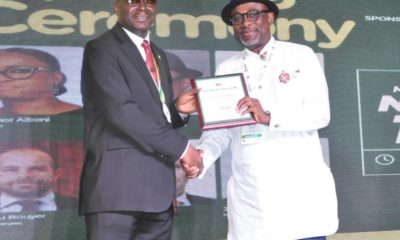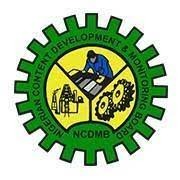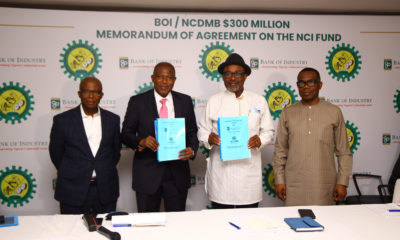Energy
NCDMB partnering Shell, Exxon, NAOC in Oil & Gas Parks – Wabote
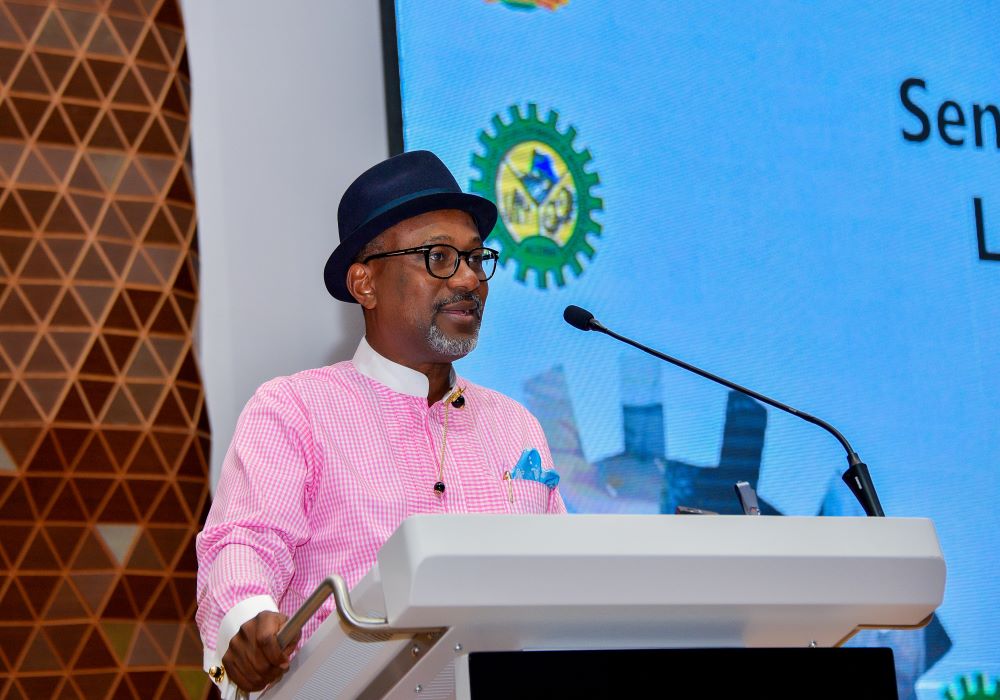
Major international operating oil and gas companies, notably Shell Petroleum Development Company (SPDC) and Exxon Mobil Nigeria, and the Nigerian Agip Oil Company (NAOC) have made significant investments in support of the ongoing development of the Nigerian Oil and Gas Parks Scheme (NOGaPS), the Executive Secretary, Nigerian Content Development and Monitoring Board (NCDMB), Engr Simbi Kesiye Wabote has revealed.
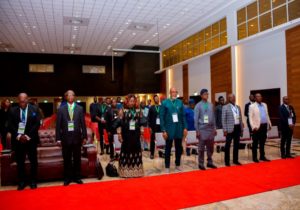
L-R: Delegates and senior officials from the NCDMB at the Nigerian Content Sensitization Programme for Law Enforcement Agencies, organised by the NCDMB in Yenagoa, Bayelsa State
He stated this recently at the Nigerian Content Sensitization Programme for Law Enforcement Agencies, organised by the NCDMB in Yenagoa, Bayelsa State with a view to strengthening the existing collaboration with various law enforcement organizations and sister agencies and leveraging their expertise and partnership to accelerate Nigerian content compliance in the oil and gas industry.
He gave a breakdown of the Board’s achievements and initiatives and hinted that NCDMB was developing the oil and gas parks in conjunction with key operators in the oil and gas industry.
According to him, Shell funded the provision of power and utility cables deployed at the oil and gas park located at Emeyal -1, Bayelsa State, while Exxon Mobil provided the electrical infrastructure for the park at Odukpani in Cross River State.
Read Also >> NCDMB To Sanction Companies For Non-Compliance With HCD Guidelines
Also, NAOC had earlier partnered with the Board to develop the 10-megawatts gas power plant that would supply electricity to the Bayelsa park when completed, in addition to providing uninterrupted electricity currently to the Nigerian Content Tower and some strategic infrastructure owned by the Bayelsa State Government.
The Executive Secretary also confirmed that the Board had signed an agreement with the Gas Aggregation Company of Nigeria (GACN) to establish a gas-fired power plant at the Odukpani, park – to provide the park with constant electricity.
He assured that the power facility will be ready before the end of 2022, about the same time the Emeyal-1 and Odukpani parks would be completed, ahead of commencing operations in early 2023.
He announced that the Board had started inviting interested manufacturing companies and other firms to apply for spaces in the parks.
The parks would have dedicated power supply and shared services and were conceived to domicile equipment components manufacturing in-country, to meet the needs of the oil and gas industry and sectoral linkages as well as create jobs for the nation’s teeming youths.
Wabote also indicated that the Board was also working to develop oil and gas parks at Oguta in Imo State, at Onna in Akwa Ibom, Ilaje in Ondo State and in Delta State, and work was progressing in different stages at the identified locations.
He confirmed that the completed oil and gas parks would be managed by professional facility managers, to ensure their sustainability.
He also stated that the Board is partnering with the Nigeria LNG Limited to develop the Brass Island Shipyard as a Capacity Development Initiative.
He hinted that the feasibility study, geotechnical survey, and site selection study had all been completed.
In addition, the land valuation and perimeter survey had also been completed and the plan is to construct the shipyard in two phases, he added.
Speaking further on the rationale for organising the workshop and engaging with law enforcement agencies, the NCDMB boss noted that “when you are speaking the same language with Customs, they will guard against the importation of goods that can be produced incountry, while immigration will help in terms of expatriate quota management.”
In his welcome address, Head Legal Services NCDMB, Barr Naboth Onyesoh said the Board recognizes the power of collaboration and the impetus it generates for the attainment of its mandate and that is why Compliance and Enforcement is one of the five pillars of the Board’s 10-year Strategic Roadmap, formulated to drive Nigerian content growth to 70 percent by 2027.
He remarked that “collaboration and stakeholder engagement was also identified in the same 10-year Roadmap as one of the four enablers to attain the 70 percent Nigerian Content growth target.”
He maintained that since the oil and gas industry serves as the mainstay of Nigeria’s economy, all stakeholders of the industry should support the implementation of the Nigerian Content Act to ensure that Nigeria derives maximum value from the oil and gas industry while it is still relevant in the global energy mix.
The workshop featured several presentations and panel discussions from representatives of the invited agencies and legal luminaries who proposed various strategies for improving enforcement and compliance with the Nigerian Oil and Gas Industry Content Development (NOGICD) Act.
Corporate Communications
July 1, 2022
Energy
Asharami Synergy Unveils Fuelling Solutions In Omagwa
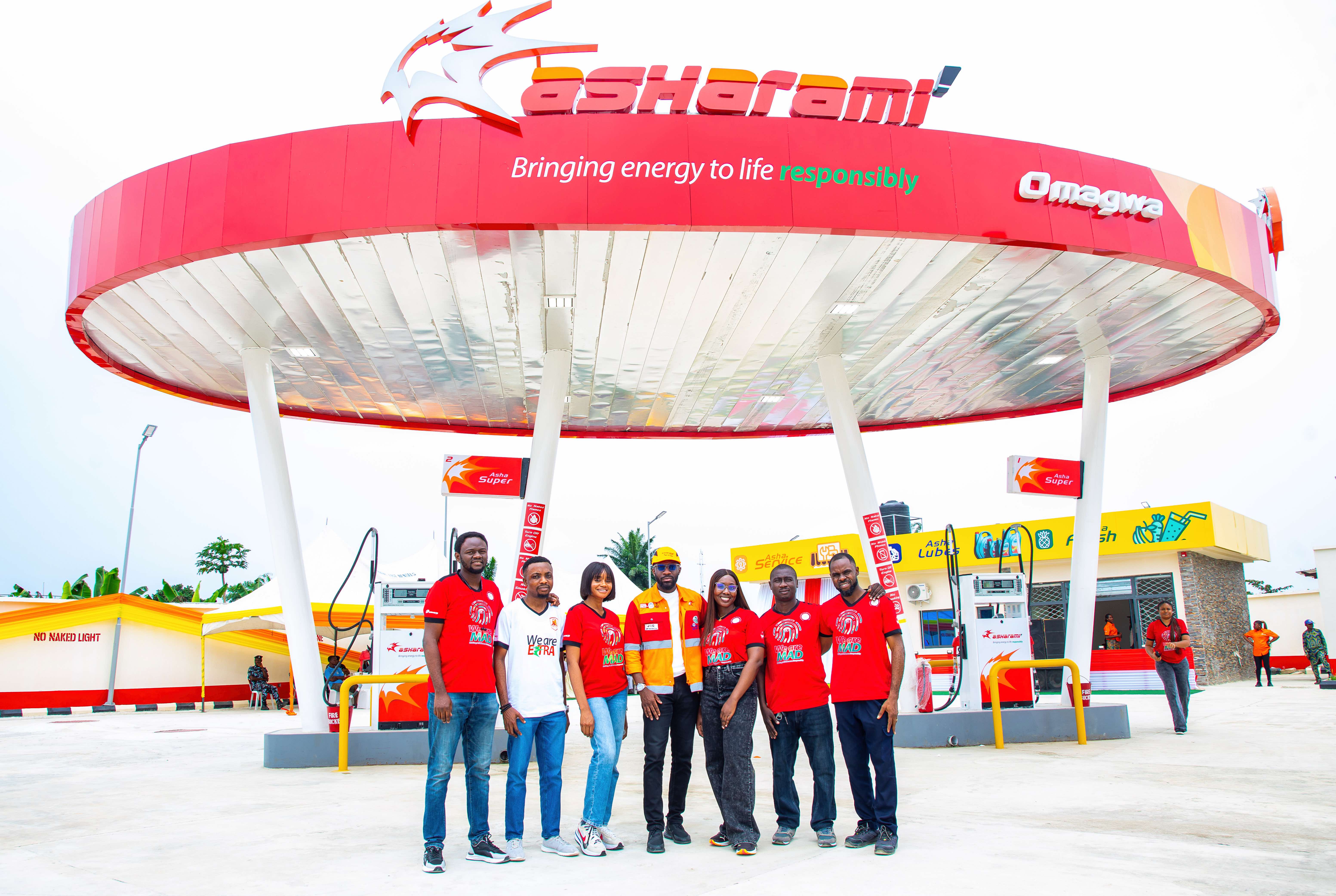
In line with its commitment to driving access to quality petroleum products, Asharami Synergy Limited, a leading Sahara Group downstream company, has said the public can now access exceptional fuelling solutions at its newly commissioned retail station in Omagwa, Rivers State.
Situated strategically along the Airport Road in Omagwa, the station, which features a storage capacity of 45,000 litres each for Automotive Gas Oil (AGO, also known as diesel) and Premium Motor Spirit (PMS, also known as petrol) is equipped with two pumps and four discharge nozzles for PMS and AGO.
The facility also has ample space for sundry services in a bid to ensure consumers get more “miles and smiles” as well as the energy to “go further” with Asharami’s world-class products.
“The Asharami Omagwa Retail Station is fully operational, offering a range of premium products and services. It’s a one-stop shop that also gives our esteemed customers eat-in and take-out restaurant services, shopping, as well as the Asha lubricants and Asha Service experience which will ensure premium care for all classes of automobiles and engines,” said Oladimeji Williams, Head, Government Relations and Business Development at Asharami Synergy.
ALSO READ: NNPCL Launches Utapate Crude Oil Blend, Eyes Production Expansion In 2025
At the Commissioning, Willaims said the new station represents an important step in Asharami Synergy’s expansion plan aimed at reaching and serving more communities responsibly. “This station is strategically positioned close to the airport, serving as the gateway for powering socio-economic development in the community and those close to it, while enabling Asharami Synergy integrate all aspects of its downstream business towards ensuring efficiency and value for our customers,” he stated.
Williams commended the Federal Airport Authority of Nigeria (FAAN) and the Omagwa community leaders for their support and collaboration throughout the project’s duration, describing it as a “seamless and productive process that highlights Asharami’s corporate stewardship and social impact” in the community.
Similarly, Ifesinachi Ezike, Regional General Manager (South South), FAAN, emphasized the broader significance of the new station, stating, “This occasion marks a significant milestone not just for Asharami Synergy but for the airport and the entire community. It marks not just an opening of a new facility but the beginning of a renewed commitment to enhancing the travel experience of all our passengers and stakeholders”.
In a move that underscores its commitment to sustainability and community development, Asharami Synergy also commissioned a solar-powered borehole during the launch. The borehole is set to improve access to clean and reliable water for residents, marking a tangible contribution to the local community.
“At Sahara, we are always making a difference—not just through our business operations; we are unwavering in our commitment to driving sustainable development and building partnerships that enhance the well-being of our host communities,” Williams added.
Energy
Awards Galore For Shell, Staff At NAPE 2024 Conference

The Shell companies in Nigeria and staff won awards in recognition of their robust participation at the 42nd Annual International Conference and Exhibition of the National Association of Petroleum Explorationists (NAPE), held in Lagos.
At the closing dinner of the event, the Managing Director of Shell Nigeria Exploration and Production Company (SNEPCo), Ronald Adams pledged sustained efforts by the company to address “the Nigerian energy trilemma by powering progress towards energy security in a sustainable manner”.
On the awards, the Shell was declared Best Overall Exhibitor and Best Exhibiting Energy company (International) just as Geophysicist Somime Oguntola took home the Award of Excellence for Oral Paper (second place).
The icing on the cake was a Shell staff, Johnbosco Uche, being installed as the new President of the NAPE.
It was gathered that the Shell companies in Nigeria have supported NAPE since its founding in 1975, using the skills and expertise of the large pool of energy professionals in its employment to improve its activities especially educational and mentoring programmes.
In addition to being a major sponsor of the 2024 conference, Shell mounted a high-profile exhibition, featuring among other things, career counselling, engagements on Nigerian Content and Contractor development and panel sessions on Women in Industry and Sustainability Energy Challenge.
A highlight was the Shell medical stand which attended to more than more than 500 conference participants and members of the public over the four days of the annual event. The doctors and nurses offered a wide range of services including laboratory tests, deworming, medical consultation as well as ophthalmology checks and distribution of nearly 300 eyeglasses.
Adams referred to the operations of SNEPCo as an example of Shell’s contribution to energy security in Nigeria. “As a result of sustained production from Bonga, we have provided funds to finance development, created a new generation of Nigerian Deepwater professionals, empowered indigenous contractors and service providers, and implemented social investments that have touched lives in the six geo-political zones of the country,” he said.
Adams added, “SNEPCo and indeed Shell are in Nigeria for the long haul. Our commitment is reflected in both our current and growth plans, all of which are grounded in principles of safety, affordability, and competitive performance.”
Energy
Accugas Denies Culpability In Akwa Ibom’s Power Outage

Owing to the persistent power outage, which has crippled economic and social life in most parts of Akwa Ibom State and environs, Accugas Limited has washed its hands off the ugly situation.
This was contained in a statement under the signature of its Communications Manager, Okwudili Onyia, in which the company traced the anomaly to a “fault in the 132-KV Aba-Itu transmission line”.
To ameliorate the situation, the company maintained that “It is imperative that the restoration of the Aba-Itu line is completed as soon as possible.”
In addition, the company pledged thus, “Accugas will continue to partner with, and support, the government of Akwa Ibom State towards achieving the government’s agenda for economic development and prosperity of the state.”
ALSO READ: NNPC Ltd To Supply 100mmscf/d Gas To Dangote Refinery
The statement reads, “Accugas Limited, a subsidiary of Savannah Energy, wishes to strongly deny the misinformation concerning its alleged involvement in the current power outage in Akwa Ibom State.
“The power cut in Akwa Ibom State is entirely due to the reported fault in the 132-KV Aba-Itu transmission line, which, unfortunately, is preventing power being transmitted from the National Grid into the State. It is imperative that the restoration of the Aba-Itu line is completed as soon as possible.
“Ibom Power Company (“IPC”) is one of 23 thermal power generation companies which channel power to the National Grid, which in turn disseminates all accumulated power to each State of the Federation through the electricity distribution companies (“Discos”). Indeed, Accugas supplies gas to enable c. 20% of Nigeria’s thermal generation capacity and, as such, is a critical enabler of the Nigerian economy.
“Within Akwa Ibom State, Accugas has been the sole supplier of gas to IPC since 2014 and, together with other Savannah subsidiaries, has invested over US$1.5 billion in gas development within the state. Furthermore, Savannah has recently invested c. US$45 million in a gas compression project at Accugas’ Uquo central processing facility at Esit Eket. Accugas’ commitments also extend to several social investment projects in the state. All the foregoing investments and projects, including other imminent investments Accugas intends to make in the State, demonstrate the Company’s long-term commitment to Akwa Ibom State and Nigeria.
“Accugas will continue to partner with, and support, the government of Akwa Ibom State towards achieving the government’s agenda for economic development and prosperity of the state.”

